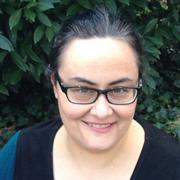Deborah Lang, PhD, Receives Grant to Examine How Some Genes are Disrupted at the DNA, RNA Level, Cause Melanoma
 Deborah Lang, PhD, associate professor of dermatology has been awarded a two-year, $300,000 Discovery Boost Grant from the American Cancer Society (ACS) for her research project “Exploring roles for PAX3 in regulating gene expression on a post transcriptional level.”
Deborah Lang, PhD, associate professor of dermatology has been awarded a two-year, $300,000 Discovery Boost Grant from the American Cancer Society (ACS) for her research project “Exploring roles for PAX3 in regulating gene expression on a post transcriptional level.”
Lang will investigate the role of PAX3 in stems cells and cancer. PAX3 is a protein that directs melanocytes (pigment cells in the skin) to maintain stem cells and to lineage specify. Cancer subverts these normal PAX3 stem cell maintenance roles to promote melanoma growth and metastasis.
Cells are not created to be cancerous, rather, they were destined for highly specified functions. This includes melanocytes that are meant to be long lived and produce pigmentation so we can be protected from harmful excessive sun exposure. However, cancer causes disruption to these normal processes. “Some of the same genes and proteins that support normal function, such as melanocyte growth or movement, become subverted in cancer and allow uncontrollable tumor cell growth and metastasis. While many of these genes become dysregulated at the DNA gene level, others become sabotaged afterwards at the RNA or protein creation steps. This may be the case with cancer fighting proteins, where the gene is working normally but the final production of an anti-tumor protein is blocked,” explains Lang.
Lang has previously discovered several PAX3-interacting proteins that play roles in RNA control and degradation. With support from the ACS, she will further investigate the relationship between PAX3 and lineage-specific RNA regulation. She hopes to target this pathway to hinder disease progression or support stem cell multi-potency, which will provide an attractive target for therapy.
Lang received her PhD from Drexel University in Philadelphia as an Oslinker Fellow in Molecular Pathobiology, with a thesis focused on transcription factors, cancer biology and cellular biology. She completed an American Heart Association post-doctoral fellowship at the University of Pennsylvania, with a focus on melanocyte developmental biology, stem cells and transcriptional regulation. After serving as a research associate at the University of Pennsylvania, she served as an instructor at the University of Chicago and was later promoted to an assistant professor.
Her work has garnered awards from foundations and institutes, including the ACS, Schweppe Foundation, American Skin Association, Harry J. Lloyd Charitable Trust, Leo Foundation, and National Institutes of Health (NIH). She has been recognized through special honors such as the Falanga endowment and the Daneen and Charles Stiefel Investigative Scholar through the American Skin Association. She has mentored many students (ranging from high school to junior faculty) and has served as an elected council member and plenary speaker of the Pan American Society for Pigment Cell Research.
The American Cancer Society’s mission is to improve the lives of people with cancer and their families through advocacy, research, and patient support, to ensure everyone has an opportunity to prevent, detect, treat, and survive cancer.
View all posts